In the world of permaculture, where sustainable and regenerative practices take centre stage, there is a growing appreciation for the often-overlooked champions of resilience: weeds. While weeds are commonly seen as nuisances in conventional agriculture, Permaculturalists recognise the valuable role these plants play in creating and maintaining a balanced and thriving ecosystem. In this blog post, we'll explore the beneficial contributions of weeds in a permaculture system and how they can be harnessed for the greater good of the environment and food production.
Dynamic Accumulators
One of the key benefits of certain weed species is their ability to act as dynamic accumulators. These plants have deep root systems that mine nutrients from the soil, bringing them up to the surface where other plants can access them. Weeds like comfrey and dandelion, for example, are known to accumulate essential minerals such as potassium, phosphorus, and calcium. In a permaculture garden, strategically placing these dynamic accumulators can enhance the overall nutrient profile of the soil, supporting the health and vitality of neighbouring crops. These weeds also make a nutrient and mineral rich compost tea which can help plants to become more resilient as our climate continues to change to more extreme temperatures on either end of the spectrum.
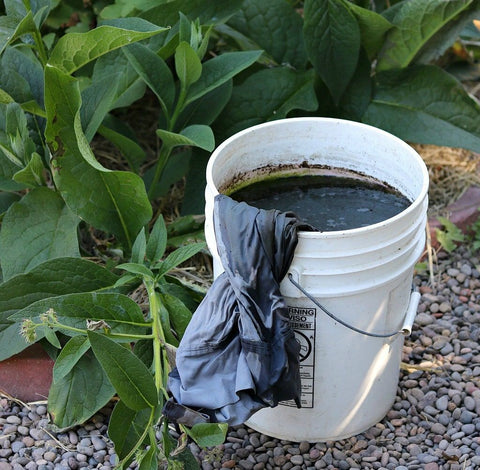
Making a compost tea with comfrey.
Soil Improvement
Weeds are often pioneers in disturbed or degraded soils, breaking up compacted earth and improving soil structure. Their deep root systems help aerate the soil, allowing water and nutrients to penetrate more efficiently. Some weeds, like clover and vetch, have nitrogen-fixing properties, which means they form a symbiotic relationship with nitrogen-fixing bacteria, enriching the soil with this vital nutrient.
Weeds can also help you play detective in your garden. If you are struggling to grow a particular plant in a patch of soil but you notice instead that a particular weed is thriving, you may have a nutrient deficiency or imbalance. The presence of plantain for example, could indicate your soil is slightly too acidic while the presence of sow's thistle could indicate your soil is deficient in iron or copper. The presence of Chickweed is often a wonderful indicator that your soil is rich and healthy - well done you! Instead of viewing weeds as adversaries, Permaculturalists leverage their natural abilities to enhance soil fertility and structure.
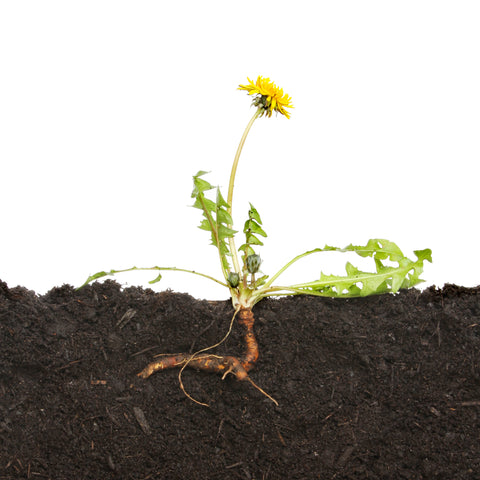
Dandelion taproots can be useful for allowing water to penetrate and break up compacted soils.
Biodiversity Support
Weeds contribute to the overall biodiversity of a permaculture system, providing habitat and food sources for a variety of beneficial insects and pollinators. Many weed species such as Borage, produce flowers that attract bees, butterflies, and other essential pollinators, fostering a healthier ecosystem. Integrating a diverse range of plant species, including weeds, creates a balanced and resilient environment that can better withstand pests and diseases without the need for synthetic inputs.
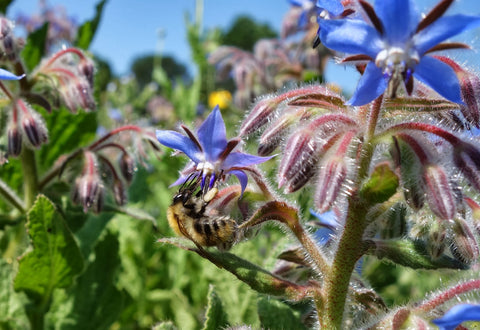
Borage attracts pollinators to the garden.
Natural Pest Management
Certain weeds play a crucial role in natural pest management by acting as trap crops or sacrificial plants. These plants attract pests away from valuable crops, diverting potential damage. Nasturtiums for example, act as a trapping crop for for aphids which are food for one of our favourite beneficial insects, the ladybug. They are also known to deter cabbage moths so they are a handy plant to have growing with your brassicas. By strategically planting specific weed species, Permaculturalists can create a more harmonious and self-regulating system, reducing the need for chemical interventions.
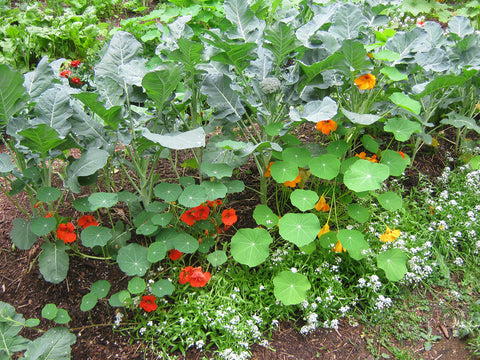
Medicinal and Edible Qualities
Many weeds possess medicinal and edible qualities that can be harnessed for human benefit. For example, purslane is a common weed rich in omega-3 fatty acids and antioxidants, while chickweed is known for its ability to soothe skin irritations and reduce inflammation in joints. And let's not forget the queen of the weeds, the dandelion. Known as a super detoxer, it's diuretic properties help to flush toxins from our kidney's and liver, as well as reduce inflammation, cholesterol and blood pressure and much more. Integrating these weeds into the permaculture system not only provides additional food sources but also enhances the overall nutritional diversity of the harvest. Why not try adding some dandelion or chickweed to your next homemade pesto or green juice!
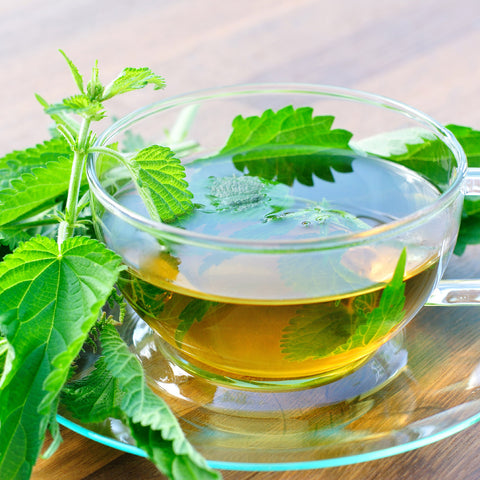
Nettle Tea Infusion
In the realm of permaculture, where sustainability and resilience are paramount, weeds are not merely unwanted invaders but rather valuable allies in creating a thriving and harmonious ecosystem. By understanding and harnessing the beneficial qualities of weeds, Permaculturalists can cultivate resilient landscapes that contribute to the well-being of the environment, soil, and human communities alike. It's time to embrace the often under-appreciated role of weeds and recognise them as essential players in the symphony of a regenerative permaculture system - and lets face it - we all have better things to be doing in our garden than weeding!
Have we peaked your curiosity? Why not check out this fabulous book - Eat Weeds by Diego Bonetto - A field guide to foraging: how to identify, harvest, eat and use wild plants.
We also stock some beneficial weed seeds such as Dandelion, Comfrey, Borage, Nasturtium and Stinging Nettle to name a few. Why not check out our huge seed range in store!






Leave a comment (all fields required)